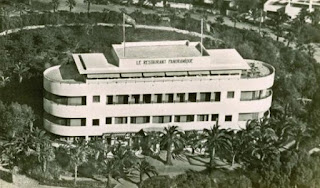Eighty years ago in agreeable surroundings Churchill and Roosevelt shape the course of the war: an attack on Italy; forcing unconditional surrender on Germany
President Roosevelt crossed the Atlantic for the first
time during the war for a summit meeting with Churchill at the luxurious
Anfa Hotel in what came to be known as the Casablanca conference.
Something of a holiday atmosphere reigned and what might otherwise have
been contentious decisions were reached after remarkably little debate.
Roosevelt's proposal to state as the Allies' war aim the unconditional
surrender of Germany was accepted. This was both a concession to Stalin
and a way of heading off any possibility of a separate German/Soviet
peace deal. In turn Roosevelt accepted the British desire for there to
be an attack on Italy once Tunisia was cleared of Axis forces, rather
than an early cross-Channel attack on France.
For the first time since November 1941 RAF Bomber Command mounted raids on Berlin. On two successive nights about 200 Lancasters were commited to the operation, but the navigational technology they used was still old school. Berlin was beyond the range of the new Oboe radio navigation system, which had already been introduced with some success on targets further to the west. Cloud en route and haze over the objective frustrated plans for the Pathfinder Force to mark targets for the main force with flares. Apart from a concentration of bomb impacts around Tempelhof, little worthwhile damage was done. The first raid lost almost no planes, but the second suffered over 10% casualties. Bomber Command was becoming a formidable force although its full potential had yet to be realised. Unusually, the RAF disclosed the identity of one of the commanders: Wing-Commander Leonard Cheshire, who was being bulit up to hero status.
The Red Army operation Iskra (spark; also the name of Lenin's pre-revolutionary newspaper) mounted to relieve Leningrad achieved a decisive success by freeing the fortress town of Schlissleberg on the shore of Lake Ladoga. This opened a narrow land corridor to the besieged city, although it had been possible to reach Leningrad when Lake Ladoga was frozen. This was enough for the Soviets to announce that the 900 day siege had been broken, although much remained to be done. This merited a headline (but no story) on the front page of The Times, which was devoted to small ads in keeping with the newspaper's antique practice.



Comments
Post a Comment